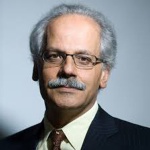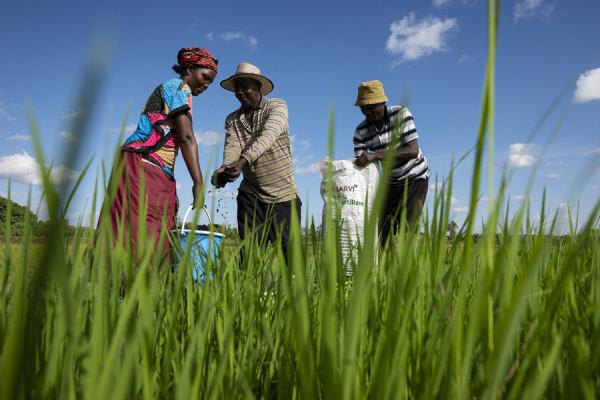Our Research Scaling a decentralized biomass torrefaction reactor for localized fertilizer production that improves farmers’ yields and reduces irrigation needs
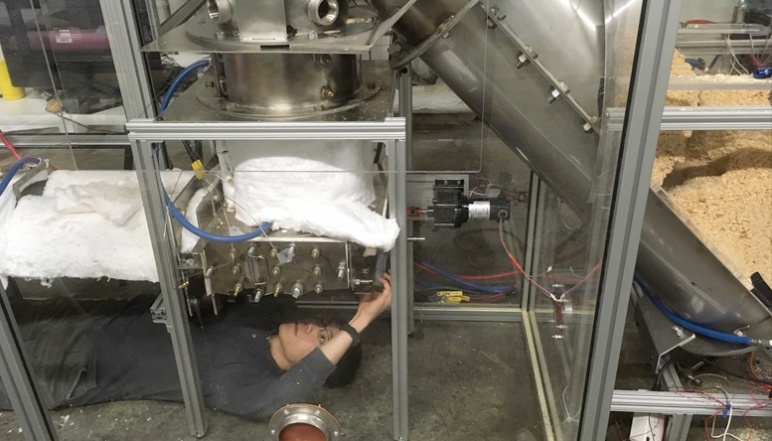
Kevin Kung working on torrefaction reactor prototype at MIT Bates lab. Photo credit: Sonal Thengane
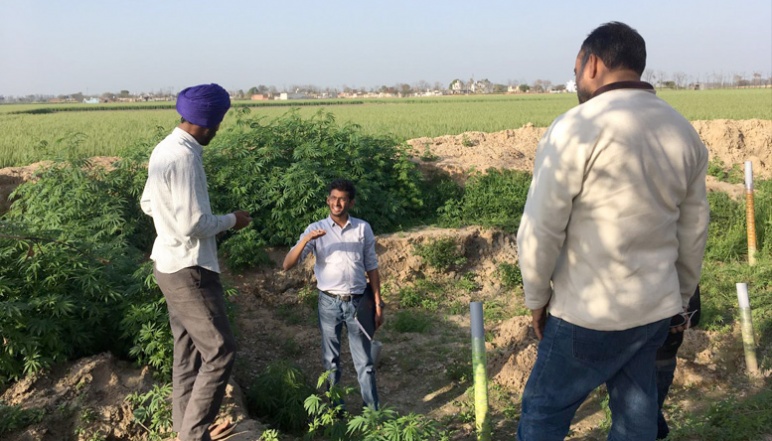
Vidyut Mohan speaking to farmers in Punjab, India. Photo credit: Sonal Thengane
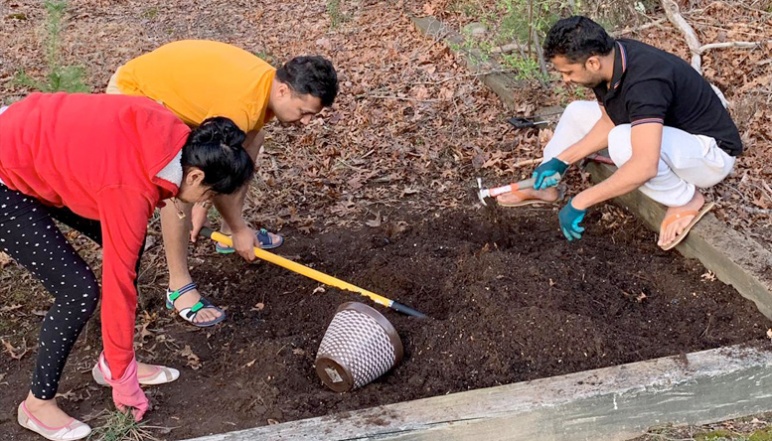
Sonal Thengane working on a biochar test plot. Photo credit: Sonal Thengane
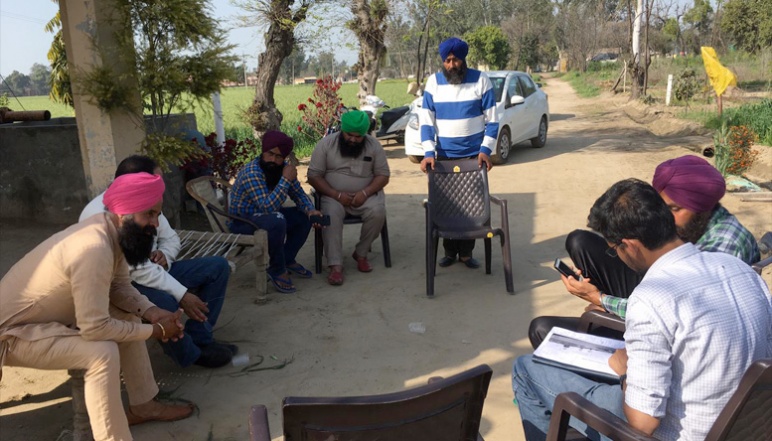
Vidyut Mohan interacting with farmers in Punjab, India. Photo credit: Sonal Thengane
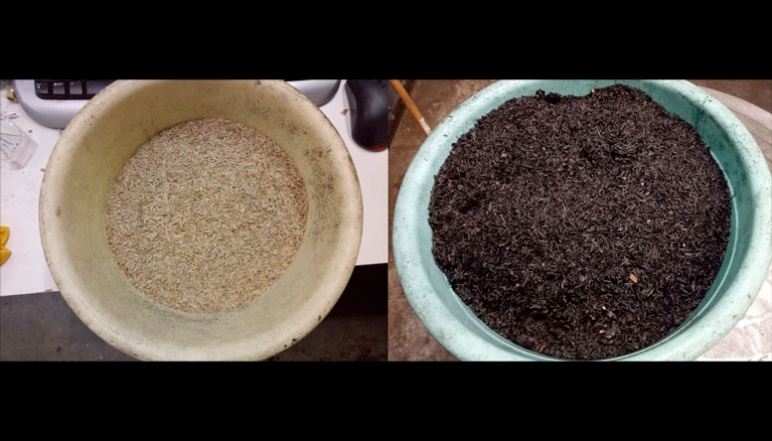
Comparison of raw rice husks and torrefied rice husks produced from our prototype. Photo credit: Kevin Kung
Principal Investigators
Ahmed Ghoniem
- Ronald C. Crane (1972) Professor
- Director of Center for Energy and Propulsion Research
- Director of Reacting Gas Dynamics Laboratory
- Department of Mechanical Engineering
Kevin Kung
- Former Postdoctoral Associate
- Department of Mechanical Engineering
Alex Slocum
- Walter M. May and A. Hazel May Professor
- ESG Director
- MacVicar Faculty Fellow
- Department of Mechanical Engineering
Challenge:
How can we reduce the cost and improve the accessibility of fertilizers to rural farmers?
Research Strategy
- Conduct technoeconomic analysis and stakeholder interviews
- Design and test prototypes
- Create and carry out multifactorial test plots
Project description
Many smallholder farmers in rural areas depend on costly, imported synthetic fertilizers that over the long term may acidify and degrade their soils. By applying a biomass pretreatment technology known as oxygen-lean torrefaction, the research team developed a series of reactor designs that can be deployed in a small-scale, low-cost, and decentralized manner in rural villages to convert the locally available agricultural residues into a carbon-rich fertilizer intermediate in just under one hour without requiring external energy input. This can drastically reduce the logistical cost of the imported fertilizer supply chain. Because their product can additionally counteract soil acidity and reduce overall farmland irrigation needs, they have estimated that at the same price that farmers pay for fertilizer inputs, their harvest yields can increase by 10%, and net income by 70%, using our technology and process, based on our experience with a small-scale village pilot. If successful, this technology could help establish a network of village-based fertilizer production facilities, each supporting a local group of 1,000 farmers within a 10-mile radius, and yielding a net profit of around $40,000/year. This then addresses a $30 billion/year opportunity in rural fertilizer access, while improving food security and reducing irrigation needs.
Outcomes
- Interviewed over 100 rural famers in India
- Collaborated with ICT Mumbai and IIT Bombay
- Produced a variety of biochar from different feedstock for initial testing
Publications
Multi-scale analysis of drying thermally thick biomass for bioenergy applications
Kevin S. Kung and Ahmed F. Ghoniem, Energy, 2019
Parametric analysis of torrefaction reactor operating under oxygen-lean conditions
Kevin S. Kung, Sonal K. Thengane, Santosh Shanbhogue, and Ahmed F. Ghoniem, Energy, 2019
A decentralized biomass torrefaction reactor concept. Part II: Mathematical model and scaling law
Kevin Kung and Ahmed Ghoniem, Biomass and Bioenergy, 2018
A decentralized biomass torrefaction reactor concept. Part I: Multi-scale analysis and initial experimental design
Kevin Kung, Santosh Shanbhogue, Alexander Slocum, Ahmed Ghoniem, Biomass and Bioenergy, 2018
News
Spinout Companies
Co-founded by Kevin Kung before the grant period, Takachar is focused on transforming biomass waste into economically marketable products around the world.. Using a novel concept called oxygen-lean torrefaction, Takachar is simplifying reactor design to enable small-scale, portable, and decentralized biomass conversion that cuts transportation cost by about 30 percent.
Takachar won the first ever Clean our Air Earthshot Prize in 2021. Launched by Prince William and The Royal Foundation in October 2020, The Earthshot Prize is the most prestigious global environment prize in history.
Co-founded by Kevin Kung before the grant period, Safi Organics uses the researchers technology to make fertilizer from crop residue. The fertilizer is proven to increase yields by more than 30% .
The company produces carbon-rich fertilizer that sequesters carbon into the soil for hundreds of years. Their conversion process also curbs the particulate emissions from traditional open-field crop residue burning by more than 95%.
Additional Details
Impact Areas
- Water
- Food
- Climate & Sustainability
Research Themes
- Technology & Commercialization
- Sustainability & Adaptation
- Soil Fertility & Crop Productivity
- Transforming Food Systems
- Equity & Access
Year Funded
- 2018
Grant Type
- India Grant
Status
- Completed
